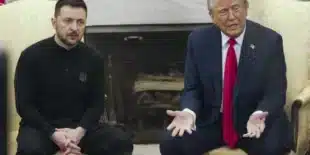U.S. special envoy Amos Hochstein arrived in Beirut on Monday amid a fragile truce between Lebanon and Israel, which began on November 27.
On Sunday, Israeli Defense Minister Israel Katz warned that no agreement would be reached unless Hezbollah withdrew beyond the Litani River. Meanwhile, Hezbollah’s new leader, Sheikh Naim Qassem, expressed concerns that the group’s patience with Israeli violations might run out before the ceasefire’s 60-day period ends.
Israeli state media reported that Israeli forces would not withdraw from southern Lebanon when the 60-day ceasefire period concludes.
Hochstein, who had spent over a year facilitating shuttle diplomacy to secure the ceasefire, now co-chairs a U.S.-led monitoring committee with representatives from France, the U.N. peacekeeping mission in southern Lebanon, as well as Lebanon and Israel.
MTV reported that Hochstein is expected to propose extending the ceasefire period by an additional 60 days. He will also caution Lebanese officials that the monitoring committee could intervene to disarm Hezbollah in southern Lebanon if the Lebanese army does not deploy ten thousand soldiers south of the Litani River.
Furthermore, Hochstein is expected to address the issue of Lebanon’s presidential election with key Lebanese figures, advocating for the election of Army Chief Gen. Joseph Aoun. MTV also mentioned that Hochstein would link Aoun’s election to the ceasefire’s continuation and Lebanon’s reconstruction efforts.
Hezbollah’s Coordination and Liaison Unit head, Wafiq Safa, stated on Sunday that his group does not have a veto over Aoun’s election, only against Lebanese Forces leader Samir Geagea. Safa also emphasized that it is the Lebanese state’s responsibility to address Israeli violations, with Speaker Nabih Berri planning to discuss these issues with Hochstein.
Before arriving in Lebanon, Hochstein met with Saudi Foreign Minister Prince Faisal bin Farhan in Riyadh.


